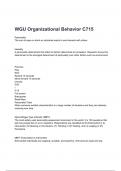WGU Organizational Behavior C715
Personality
The sum of ways in which an individual reacts to and interacts with others.
Heredity
A personality determinant that refers to factors determined at conception. Research shows this
determinant is the strongest determinant of personality over other factors such as environment.
Previous
Play
Next
Rewind 10 seconds
Move forward 10 seconds
Unmute
0:00
/
0:15
Full screen
Brainpower
Read More
Personality Traits
When someone exhibits characteristics in a large number of situations and they are relatively
enduring over time.
Myers-Briggs Type Indicator (MBTI)
The most widely used personality-assessment instrument in the world. It is 100 questions that
ask how people feel or act in situations. Respondents are classified as (E) Extroverted or (I)
Introverted, (S) Sensing or (N) Intuitive, (T) Thinking or (F) Feeling, and (J) Judging or (P)
Perceptive
MBTI: Extroverted vs Introverted
Extroverted individuals are outgoing, sociable, and assertive. Introverts are quiet and shy.
,MBTI: Sensing vs Intuitive
Sensing types are practical and prefer routine and order, and they focus on details. Intuitives
rely on unconscious processes and look at the "big picture."
MBTI: Thinking vs Feeling
Thinking types use reason and logic to handle problems. Feeling types rely on their personal
values and emotions.
MBTI: Judging vs Perceiving
Judging types want control and prefer order and structure. Perceiving types are flexible and
spontaneous.
Cons of Using MBTI Model
Cons - Forces a person into one type or another and there is no in-between. When people
retake the assessment, they often receive different results. Interpreting the results requires
training that can leave room for error. Results can also be unrelated to job performance.
Big Five Model
Proposes that five basic dimensions underlie all others and encompass most of the significant
variation in human personality. Factors are Conscientiousness, Emotional Stability,
Extraversion, Openness to Experience, and Agreeableness.
Big Five Model: Conscientiousness
Measures reliability. It is the best predictor of job performance. A highly conscientious person is
responsible, organized, dependable, and persistent. Lower scoring individuals are easily
distracted, disorganized, and unreliable.
Big Five Model: Emotional Stability
Measures a person's ability to withstand stress. High scoring individuals tend to be calm,
self-confident, and secure. They are likely to be positive, optimistic, and experience few
negative emotions. They are likely to have the most job satisfaction. Low scorers (opposite end
of the spectrum known as having high neuroticism) are hypervigilant and vulnerable to the
physical and psychological effects of stress. They tend to be nervous, anxious, depressed, and
insecure.
Big Five Model: Extraversion
, Measures our comfort level with relationships. High scorers tend to be gregarious, assertive,
and sociable. They are generally happier and often ambitious. Low scorers (introverts) tend to
be more thoughtful, reserved, timid, and quiet.
Big Five Model: Openness to Experience
Measures to range of interests and fascination with novelty. High scorers are creative, curious,
and artistically sensitive. Low scorers are conventional and find comfort in the familiar.
Big Five Model: Agreeableness
Measures an individuals propensity to defer to others. High scorers are cooperative, warm, and
trusting. Low scorers are cold and antagonistic.
Big Five Traits - Why Relevant - What Does It Affect (Chart)
Dark Triad
Three other socially undesirable traits which we all have in varying degrees. They are
Machiavellianism, Narcissism, and Psychopathy
Machiavellianism
High scorers are pragmatic, maintain emotional distance, and believe ends can justify the
means. Tend to be manipulative, persuasive, aggressive, and not well liked.
Narcissism
High scorers are people with a grandiose sense of self-importance, they require excessive
admiration, and are arrogant. They often have fantasies of grand success, a tendency to exploit
situations and people, a sense of entitlement, and a lack of empathy.
Psychopathy
In organizational behavior, this does not connote clinical mental illness. In OB context, it is
defined as a lack of concern for others, and a lack of guilt or remorse when actions cause harm.
Core Self-Evaluations (CSEs)
Bottom-line conclusions individuals have about their capabilities, competence, and worth as a
person. People with positive CSEs see themselves as effective and in control of their
environment. People with negative CSEs tend to dislike themselves, question their capabilities,
and view themselves as powerless over their environment.




